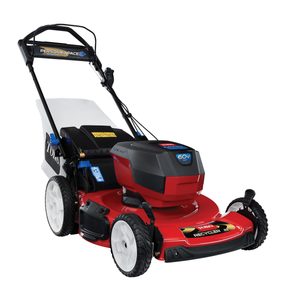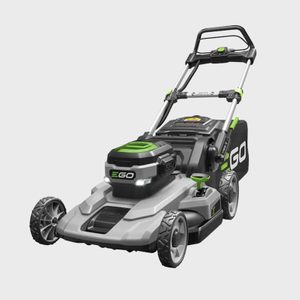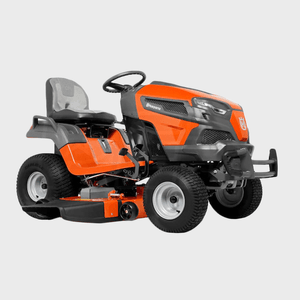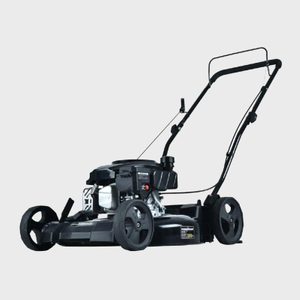Electric vs Gas Lawn Mowers: How to Decide
Updated: Nov. 22, 2023

In the market for a new lawn mower, but not sure which type is best? Let us help you navigate the debate on electric vs. gas lawn mowers.
Our editors and experts handpick every product we feature. We may earn a commission from your purchases.
With more lawn mower models on the market than ever before, and so many sizes, styles and features to consider, making buying a lawn mower isn’t as simple as it once was. And now, electric mowers are making a big splash in the lawn care industry.
Not long ago, mower motors required too much juice for a cord or batteries to be practical. Not anymore. Modern refinements and innovations allowed corded and battery-powered electric lawn mowers to burst onto the scene with gusto.
Gas-powered mowers ignite a mixture of air and fuel, compressing it in a cylinder, then igniting it with a spark to create a miniature explosion which is harnessed to power the machine. Electric mower motors, however, feature magnets interacting with electromagnets, energizing metal coils to move rotors and create power. Electric mowers can be powered by batteries or a 120-volt receptacle via extension cord.
On This Page
Lawn Mower Considerations
Motor Power
Lawn mower manufacturers can be disingenuous about the real world power levels of their products. It’s not uncommon for electric mowers, for example, to have their “max torque” specs touted as evidence they match gas-burning models in power output. This is deceptive.
Max torque gives an inflated perspective of a mower’s true power because it measures engine torque under little or no load. The fact is, horsepower is the only reasonable unit of measure for lawn mowers, which I suspect is why electric lawn mower manufacturers don’t share this figure. The real-world horsepower of most electric mowers is half, or less than half, the horsepower of a similarly sized gas-powered machine.
Run Time
It’s hard to measure exactly how much run time you’ll get from a tank of gas in your average fuel-burning mower, because much depends on the speed you run it and the density of the grass you’re cutting. It’s a safe bet, though, that a tank of gas will last longer than a fully charged battery on any equivalent electric model.
Most electric mower manufacturers give a maximum run time estimate, which for push and self-propelled mowers is almost always an hour or less. Riding electric mowers might run two hours, tops, on a single charge. Plug-in mowers don’t require batteries and will keep running continuously unless there’s a power outage. In that case, a generator with sufficient voltage capacity can keep you going.
The Environment and Noise
While power and run time certainly favor gas-powered mowers, noise and environmental considerations support electric. Battery-powered mowers have zero carbon emissions, so running one won’t contribute to climate change. Even the best gas-powered mowers can give off a significant amount of emissions.
Noise is also a factor worth considering. Many municipalities regulate the acceptable amount of yard noise. Big, beefy gas-powered mowers can easily exceed these guidelines, but battery-powered mowers almost certainly won’t.
Note: Some users find vibration is more severe and bothersome with gas burning mowers than electric.
Laws and Regulations
In some states, the laws will dictate which mowers you can and can’t buy. California passed a law in 2021 banning the sale of gas-powered lawn equipment. That will take effect as soon as 2024. However, to help ease this transition, California has set aside $30 million for a rebate program to offset the cost of new zero-emission equipment for professional gardeners and landscapers.
Manufacturers are starting to follow suit. John Deere unveiled its very first electric riding mower in 2023, with additional models to come. Honda announced in 2022 that it will stop making gas-powered mowers all together.
Operating and Maintenance Costs
Although it’s tempting to believe battery-powered mowers will always cost less than gas-burning mowers long-term, this isn’t necessarily the case. Although you’ll almost certainly spend less on electricity charging your batteries or running your corded mower then on gas and lawn mower oil for your fuel-burning machine, there’s more to the equation.
Lithium ion batteries don’t last forever and eventually need replacement. They’re not cheap, either. If your electric mower comes with a generous warranty, you might be lucky enough to get a replacement battery (or batteries, if your mower takes two) for free when yours bites the dust. Otherwise, you could be looking at a $200 to $400 expense.
Ease of Use
Electric mowers are usually simpler to use and maintain than their gas-powered counterparts. They don’t need gas, oil changes or new air filters, and you don’t have to make sure the carburetor and spark plugs are clean and functional.
Electric Lawn Mower Pros
- Much quieter;
- Lower maintenance (no fueling, oil changes, belt replacements, air filter changes, etc.);
- Zero carbon emissions;
- Lighter weight (matters for push mowers you need to lift and store).
Electric Lawn Mower Cons
- Battery power only lasts a couple hours (and often less) before requiring charging;
- Corded models can only be used near a power source, unless you have an extremely long extension cord;
- Extension cords are troublesome to lay out and roll up again for storage;
- Often have much less power than most equivalent gas-burning models;
- Replacement batteries are often expensive.
Gas Lawn Mower Pros
- Generally much more powerful than electric mowers;
- Don’t require cords or batteries;
- Often built tougher;
- Replacement parts are often less expensive than those for electric mowers.
Gas Lawn Mower Cons
- Considerably louder than electric mowers;
- More costly to run (unless you need to replace a battery outside the warranty period);
- Require more maintenance (winterizing your lawn mower, oil changes, etc.);
- Generate carbon emissions.
How To Choose the Right Mower
Battery-powered mowers work best for people with small lots who want to minimize maintenance, noise and carbon emissions. But if noise and exhaust don’t bother you, and you just want to mow and be done with it as quickly as possible, you’re probably better off going gas-powered.
Whether you go with gas or electric, it’s important to choose the right model for your needs. If you’ve got an acre or less to mow, a self-propelled walk-behind mower is probably your best bet. If you’ve got a larger lawn or simply don’t like walking and mowing at the same time, a riding mower will make your life much easier.
More detailed considerations like engine power, blade speed, deck width and other features come down to personal preference and available budget.




